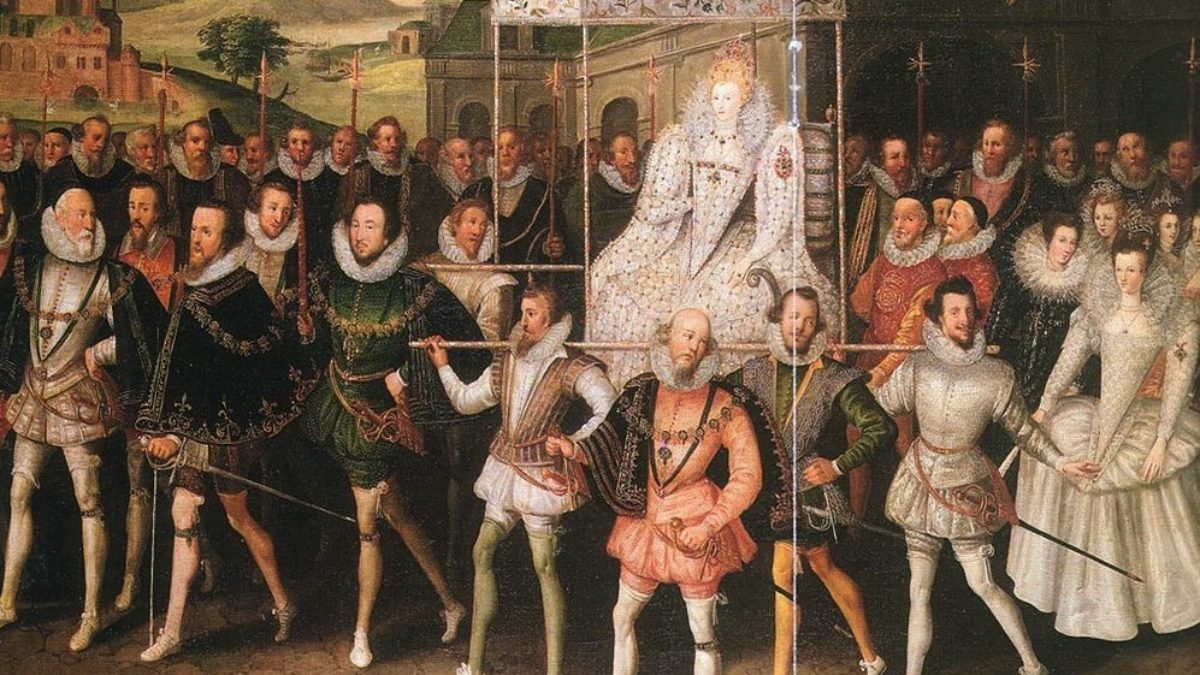Elizabeth’s reign was marked by intrigue, war, rebellion, and personal and party strife. Yet there were solid foundations under the state and society that produced the wealth and victories of the Elizabethan Age and its attainments in literature, music, architecture, and science. The economy prospered in an era of unbridled individual enterprise.
The solid administrative system was based on national unity. A common sentiment kept the English together and set limits beyond which most of them would not carry disagreement. Elizabeth herself played a large part in holding her subjects together. Her religious policy, for example, was directed at stretching the already broad principles and practices of the Church of England so that they would cover near-Catholicism at one extreme and near-Congregationalism at the other.
The age of Elizabeth was marked by a remarkable flowering of culture. This was the English Renaissance, when ladies and gentlemen played the lute, sang madrigals, admired painting, and sought to dress as did their counterparts in Italy. The high glory in the English Renaissance lay in its literature, in the works of William Shakespeare (1564-1616), Francis Bacon (1561-1626), Edmund Spenser (1552-1599), and many others who shaped the English language for generations to come.
These Elizabethans and Jacobeans were exuberant even in their refinement, full-blooded even in their learning. To a later generation they were uncouth, undisciplined, too full of the gusto of life. To the nineteenth- century romantics, they were brother sin romance, and nineteenth-century scholars rediscovered the Elizabethan age. The love of excess is obvious in much Elizabethan writing: in the interminable, allusion-packed, allegory- made stanzas of the Faerie Queene; in the piling up of quotations from the ancient Greeks and Romans; in Shakespeare’s fondness for puns and rhetorical devices; in the extraordinarily bloody tragedies and exuberant comedies that made Elizabethan drama second only to that of the ancient Greeks.
Shakespeare is the most quoted author of all time. The son of a glove manufacturer in Stratford-on-Avon, Shakespeare began his career on the London stage, where he was well recognized before he was thirty. He became part owner of the Globe Theatre, which from 1603 presented his plays to raucous London audiences. Ever since that time he has been recognized as the genius of Elizabethan literature and a supreme example of Renaissance views on individualism.
He wrote classical dramas like Julius Caesar and Antony and Cleopatra; famed comedies such as The Tempest and Much Ado About Nothing, stirring histories that gave the English a strong sense of pride, as in Richard II and Henry IV; and above all, the greatest tragedies since the days of the ancient Greeks—Othello, Macbeth, Hamlet, and King Lear. He took up literature’s great themes; sin, revenge, love, honor.
Contemporaries of Shakespeare’s contributed importantly to the Elizabethan Renaissance. Edmund Spenser’s The Faerie Queene is recognized as perhaps the finest moral epic of Western writing. Sir Thomas More’s Utopia, the product of an earlier time, became a revolutionary argument much debated in Shakespeare’s time, as it described an ideal community on an island off the New World and argued that crime and violence did not come from the inherently corrupt nature of men and women, as had been argued in earlier centuries, but were the product of society. This view is commonplace today—it is widely believed that education, the environment, the laws of society, the nature of punishment, the workplace, and the family shape a person’s behavior—but in the sixteenth and seventeenth centuries it was revolutionary.
The Elizabethan Renaissance, which ended with Queen Elizabeth’s death in 1601, merged into the Jacobean period, in which Shakespeare produced some of his finest work. One other important product of this period was the King James Version of the Bible. In 1604 Puritan theologians asked James I to support a new translation of the Scripture, and the committee of scholars to whom he committed the assignment completed the Bible in the form we know it today, divided into chapters and verses, in 1611. Because it was in English, and hence accessible to lay readers, it increased literacy and profoundly influenced the developed of the English language.

